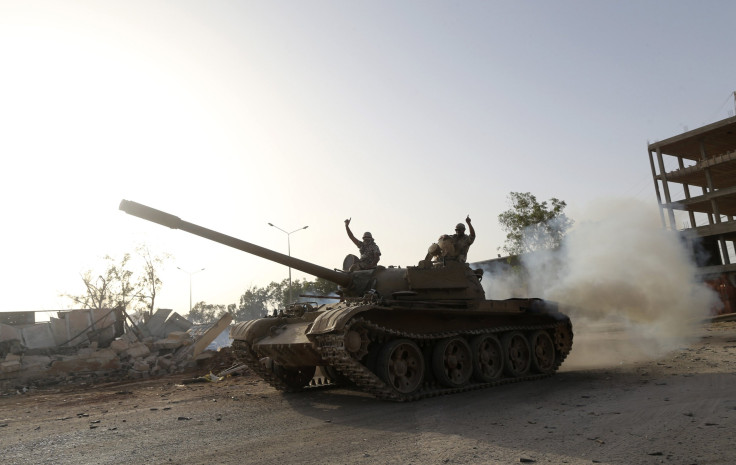Libyan Pilots Bombing Benghazi In Egyptian Aircraft? Highly Unlikely, Experts Say

Claims by a Libyan lawmaker that airstrikes by Egyptian planes against jihadists in the country were actually conducted by Libyan pilots appears highly unlikely, according to two aviation experts. The Egyptian intervention marked the first time in decades that the most populous Arab country took part in a conflict outside its borders. But the idea that it outsourced airstrikes to Libyan air force pilots is preposterous, according to those experts.
Libya’s air force has been in disarray since the U.S. and coalition air campaign in 2011 that destroyed most of its antiquated equipment. Even before the ouster of dictator Moammar Gadhafi, it was a marginal fighting force and would not be able to supply pilots that could fly anything in Egypt’s modern fleet.
“Even if there were a trained cadre of Libyan pilots waiting for a job, the idea that they could be instantly proficient at flying Egyptian strike aircraft strains credibility,” said Richard Aboulafia, a military aviation expert and vice president of analysis at Teal Group, a Virginia-based think tank.
“Libya only operated Russian fighters, while Egypt went all-Western decades ago,” he added.
The campaign, which began in Benghazi on Wednesday in what Egypt says is “a battle for Egypt, not Libya,” according to an official quoted by the Associated Press, is expected to last three to six months and will include Libyan ground troops that were recently trained by Egyptian forces.
In a statement on Egypt’s state-run news agency, however, presidential spokesperson Alaa Youssef denied that Egyptian planes were striking targets in Libya.
While it is not yet clear why Libyan officials would claim that it was Libyan pilots doing the bombing, Egypt's denial that the bombings happened at all may be designed to placate Islamists back in Egypt.
According to David Cenciotti, editor of the Aviationist blog and a former Italian air force officer, Libya has only a handful of fighter jets, “obsolete, scarcely overhauled Soviet combat planes that have survived the uprising and the subsequent fierce struggle between militias.”
The main aircraft flown by the Libyan air force is the aging Russian-built MiG-21. “The Egyptian air force is known to operate [a] few remaining MiG-21[s], making this 40-year-old plane a candidate for a purely theoretical use by Libyan pilots in an airstrike,” said Cenciotti in an email. But it isn't clear why Egypt, which has dozens of modern, American-made F-16s equipped with highly precise weapons, would resort to using Soviet airplanes from the Vietnam War era.
Egypt has made no secret of its willingness to get rid of the Islamist threat that is operating on its western border, which it views as a direct security threat. It has recently made many offers of military support and training to the Libyan government, which relocated to Tobruk, close to Egypt, after losing control of the capital Tripoli to Islamist militias. But it's unclear how it could have compressed into a few weeks the years of training required to conduct airstrikes in a modern jet.
“I don't believe any Libyan pilot may have attained the required training and experience to carry out the attack. Usually, [bombing] missions are flown by the most experienced aircrews, who own the "mission capable" qualification, whereas, generally speaking, Libyan pilots are elderly officers who have flown little flight hours in the last decade or so. They could hardly be proficient at war without continuous, consistent training,” said Cenciotti.
© Copyright IBTimes 2024. All rights reserved.






















